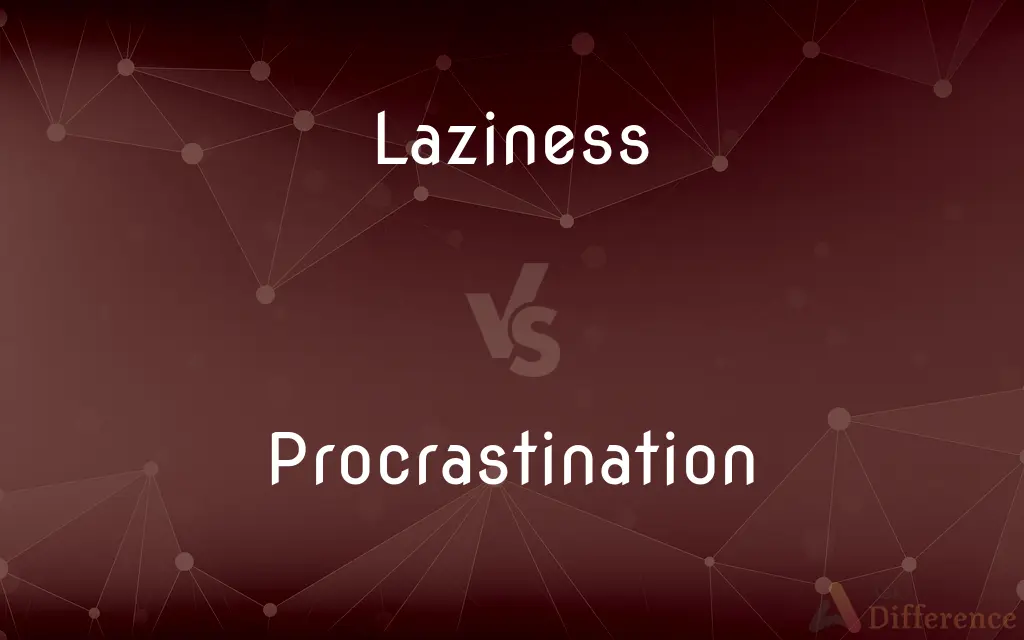Laziness vs. Procrastination — What's the Difference?
By Tayyaba Rehman — Published on September 27, 2023
Laziness is an unwillingness to work or use energy; Procrastination is the act of delaying tasks one intends to complete. Both involve inaction but differ in motivation.

Difference Between Laziness and Procrastination
Table of Contents
ADVERTISEMENT
Key Differences
Laziness and Procrastination both result in inactivity, but their roots diverge in understanding human behavior. Laziness is primarily characterized by a lack of desire to engage in work or exert effort. It's an inherent trait or habit where the individual simply doesn't want to do anything. This state isn't necessarily linked to specific tasks but is more of a general attitude.
Conversely, Procrastination is quite task-specific. It is when someone has the intent to complete a task but keeps putting it off. Here, the desire to finish the task exists, but other factors—like fear of failure, perfectionism, or even mere distraction—can lead to its delay.
In Laziness, the issue is an absence of motivation. In contrast, Procrastination involves a battle between the urge to delay and the desire to act. Someone who's lazy might avoid tasks altogether, while a procrastinator might avoid today's task, intending to tackle it tomorrow.
Finally, while both Laziness and Procrastination can hinder productivity, addressing them requires distinct approaches. Overcoming Laziness might require cultivating motivation, whereas tackling Procrastination often involves breaking tasks into manageable steps and removing distractions.
Comparison Chart
Primary Meaning
Unwillingness to exert effort.
Delaying tasks one intends to complete.
ADVERTISEMENT
Root Cause
Lack of motivation or interest.
Task-specific delays, often due to avoidance.
Longevity
Can be a consistent trait.
Often temporary and task-specific.
Associated Feelings
Indifference or lethargy.
Guilt, anxiety, or stress.
Overcoming Approach
Cultivating motivation and interest.
Breaking tasks into steps, setting deadlines.
Compare with Definitions
Laziness
A state of inaction and idleness.
Laziness often leads to wasted days.
Procrastination
Deferring action, especially without a valid reason.
Procrastination can be a result of fear of failure.
Laziness
An inclination to rest or relax rather than exert oneself.
The hot weather only added to their Laziness.
Procrastination
Deliberate delay despite knowing the importance of a task.
Knowing the benefits, his Procrastination in exercising was perplexing.
Laziness
The quality of being unwilling to work or exert effort.
His Laziness prevented him from achieving his potential.
Procrastination
Habitually putting off tasks that one intends to complete.
Her Procrastination was a barrier to her success.
Laziness
A lack of enthusiasm or energy to do tasks.
Laziness can be a result of chronic fatigue.
Procrastination
The act of delaying or postponing tasks.
Procrastination led to a last-minute rush before the deadline.
Laziness
Not willing to work or be energetic.
Procrastination
To put off doing something, especially out of habitual carelessness or laziness.
Laziness
Slow-moving; sluggish
A lazy river.
Procrastination
To postpone or delay needlessly.
Laziness
Conducive to inactivity or indolence
A lazy summer day.
Procrastination
The act of postponing, delaying or putting off, especially habitually or intentionally.
Laziness
Depicted as reclining or lying on its side. Used of a brand on livestock.
Procrastination
The act or habit of procrastinating, or putting off to a future time; delay; dilatoriness.
Procrastination is the thief of time.
Laziness
The quality of being lazy
Procrastination
The act of procrastinating; putting off or delaying or defering an action to a later time
Laziness
The state or quality of being lazy.
Laziness travels so slowly, that Poverty soon overtakes him.
Procrastination
Slowness as a consequence of not getting around to it
Laziness
Inactivity resulting from a dislike of work
Procrastination
A behavioral struggle between delay and intention to act.
Despite his intentions, Procrastination kept him from starting.
Laziness
Apathy and inactivity in the practice of virtue (personified as one of the deadly sins)
Laziness
Avoidance of activity out of habit or nature.
Her Laziness was evident as she skipped chores.
Common Curiosities
Are Laziness and Procrastination the same?
No, Laziness is a lack of motivation, while Procrastination is delaying tasks despite intention.
Why do people Procrastinate even when they want to complete tasks?
Fear of failure, perfectionism, or overwhelm can cause Procrastination.
Can someone be lazy but not a procrastinator?
Yes, a lazy person might lack motivation in general, without specific tasks they're putting off.
Is Procrastination always a bad thing?
Not always; sometimes it can lead to better decision-making or creativity, but chronic Procrastination can be harmful.
What are common causes of Laziness?
Fatigue, lack of interest, or demotivation can lead to Laziness.
Can someone be both lazy and a procrastinator?
Absolutely, an individual can lack motivation (Laziness) and also delay specific tasks (Procrastination).
Can Laziness be a medical condition?
While Laziness itself isn't a diagnosis, underlying conditions like depression can manifest as Laziness.
Are there tools to combat Procrastination?
Yes, techniques like the Pomodoro method or setting specific deadlines can help.
How can one overcome Laziness?
Setting goals, finding motivation, and building habits can combat Laziness.
What's the psychological basis for Procrastination?
It often stems from a mismatch between present desires and future goals.
Can both Laziness and Procrastination be occasional behaviors?
Yes, everyone can have moments of Laziness or occasional Procrastination, without it being a chronic issue.
Is Procrastination a modern problem?
While it's accentuated today with distractions like social media, Procrastination has been discussed for centuries.
Does Laziness always indicate a lack of interest?
Often it does, but not always. External factors or health issues can also lead to Laziness.
Do external factors influence Laziness?
Yes, factors like environment, upbringing, and cultural attitudes can impact Laziness.
Can a tight deadline lead to Procrastination?
Paradoxically, yes. The pressure can make some people avoid tasks.
Share Your Discovery

Previous Comparison
Perishable vs. Non-Perishable
Next Comparison
Comic Book vs. Graphic NovelAuthor Spotlight
Written by
Tayyaba RehmanTayyaba Rehman is a distinguished writer, currently serving as a primary contributor to askdifference.com. As a researcher in semantics and etymology, Tayyaba's passion for the complexity of languages and their distinctions has found a perfect home on the platform. Tayyaba delves into the intricacies of language, distinguishing between commonly confused words and phrases, thereby providing clarity for readers worldwide.
















































